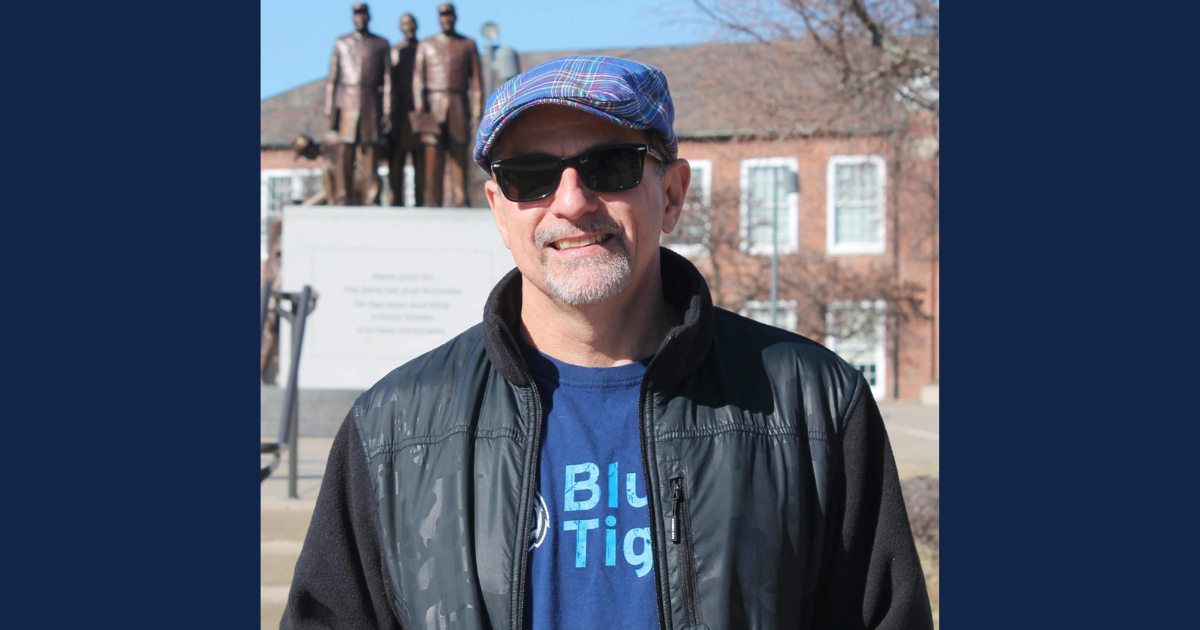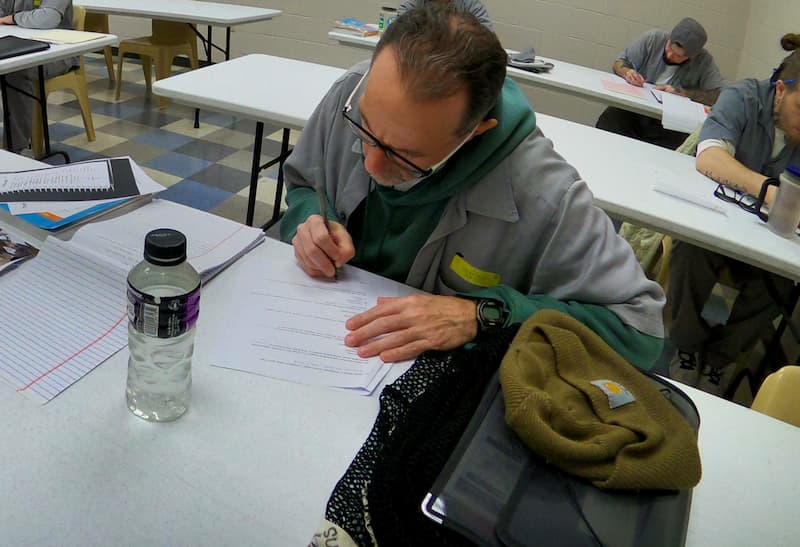Ramsey Pickens: From Incarceration to Campus
Office of Communications and Marketing
Young Hall
820 Chestnut Street
Jefferson City, MO 65101
 Ramsey Pickens is a junior computer science major at Lincoln University. He began his academic journey in the LU Prison Education Program. (Photo credit: Caroline Glydewell)
Ramsey Pickens is a junior computer science major at Lincoln University. He began his academic journey in the LU Prison Education Program. (Photo credit: Caroline Glydewell)
Ramsey Pickens never imagined the bars of a prison door opening to such a bright and promising future. After serving a lengthy prison sentence, the 52-year-old non-traditional computer science student now walks the campus of Lincoln University. His story truly serves as the epitome of second chances and hope after lock-up.
Pickens spent nearly three decades behind bars for a serious felony committed not far from his days as a teen in northwest Missouri. An uncertain future beyond prison walls, in 2022, he was offered the opportunity to become a part of the first cohort to enter a new prison education program at Jefferson City Correctional Center (JCCC), the state’s largest maximum-security prison. The program is designed to give inmates an opportunity to earn their bachelor’s degree before returning to society.
“What type of person would you want reentering society — one who is educated and has an opportunity for success, or the person who hasn’t changed at all?” Ramsey Pickens said.
In 2021, Lincoln University was approved to take part in the Second Chance Pell Initiative, which allows inmates to use education grants for college prison education programs. This provided LU with the ability to start offering classes to a select cohort of about 12 inmates at JCCC in the fall of 2022.
Enrollment into the program was not an easy process for Pickens. Certain requirements must be met before being accepted. Once in, students must maintain a suitable GPA and progression through the coursework. Lincoln professors teach the fall/spring classes inside the prison, with each course meeting one night per week, four days a week. Prison students take 12 credit hours per semester.
“To become a part of the program, I had to write an essay stating why I would be a good fit,” Pickens said. “The prison administration had very strict guidelines, which I passed.”
Since being paroled last March, he has successfully transitioned from a prison classroom to the campus classrooms at LU as a computer science major. Pickens has continued to maintain a high GPA since his enrollment, landing him a spot on the dean’s list each semester since entering the program.
“The students inside (JCCC) are excited about getting out,” Pickens said. “They see the way Lincoln welcomed me and the success I have, and it encourages them to finish their degrees and provides them proof that chasing your education is worth the work.”
Now, as he shares classrooms with students much younger than himself, Pickens is mindful of the unique perspective he brings.

JCCC Prison Education Program student Ramsey Pickens works on an English 101 midterm exam inside a prison classroom. March 7, 2023. (Photo credit: Will Sites)
“The prison environment is filled with young adults, so I do not feel out of place in on-campus classes,” he said. “I’ve never been directly asked by students about my past, and I generally do not share the details unless it is necessary, but this article is something different. I think my experiences can be inspirational for students and others.”
Pickens is a living testament to the program’s potential to reduce recidivism and rebuild lives. “Since the 70s, statistics have shown that the higher the education level achieved, the less likely an offender is to reoffend,” Pickens said. “Achieving a bachelor’s degree reduces recidivism by 75 percent. That is huge!”
For the professors involved in the program, teaching inside the prison has been a deeply rewarding experience.
“The prison students take full advantage of the rare opportunity to be in a four-year college degree program,” LU journalism associate professor Will Sites said. “It’s an awesome experience – I’d like to see more professors getting involved.” While the content of the classes remains consistent inside and outside prison walls, the learning environments differ in notable ways.
Technology is minimal and prisoners remain on tight schedules. “Prison students don’t have the distractions that I find on campus, like cell phones, computers and the option to be late or skip class,” Sites said. “There is absolute attention on the professor and what is being taught.” His prison students have a lot more life experience, which becomes part of the classroom.
The professor notes that prisoners are often eager to use the past as part of the educational process. He says the JCCC students readily admit the mistakes of life and the paths that led them to incarceration. The college degree program teaches them how to be responsible.
“They have to work hard, be honest with themselves and be motivated to stay the course,” Sites said. “I’ve been very impressed with the students, and I’m looking forward to watching them become productive members of society after JCCC.”
As for the future, there is optimism that other incarcerated students will follow in Pickens’ footsteps.
“The program is purposely designed to help students move from prison to a college campus,” Sites said. “I think if they have enough support on the outside, there’s no reason why the prison students won’t be successful on campus and/or in their jobs.”
This article originally appeared in The Clarion, Lincoln University's historic student newspaper, and is reprinted here with permission.
